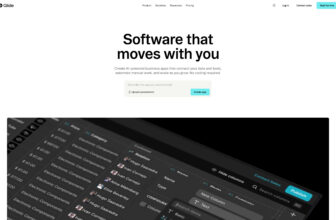Our Verdict
What is Adalo
Adalo is one of those no-code tools that’s made app development feel a lot more approachable. Instead of writing lines of code, you drag and drop different components to piece your app together. It handles both mobile and web apps, and when you’re ready, you can publish directly to the App Store, Google Play, or even just launch it as a Progressive Web App. What makes Adalo stand out is how it combines design and functionality in one place—you can set up databases, add user logins, and connect to APIs without leaving the editor. For small teams, startups, or anyone testing an idea, it’s a practical way to build an MVP without investing in a full dev team.
Is Adalo worth registering and paying for
Adalo is definitely worth registering, especially since its free tier allows you to experiment, design, and even publish Progressive Web Apps without paying. For anyone building an MVP, internal tool, or simple mobile app, the paid plans are worth considering because they unlock native publishing to iOS and Android, remove Adalo branding, enable custom domains, and offer integrations with services like Xano or Airtable. That said, Adalo does have drawbacks—users often report performance issues when apps grow more complex, scalability challenges for larger projects, and occasional reliability concerns. In short, Adalo is a great choice for beginners, startups, and small teams who need to launch quickly, but it may fall short for enterprise-grade, high-performance applications.
Our experience
We chose to explore Adalo for a team project where we needed to build a mobile app for a client’s community platform, and it was an empowering experience that made our collaborative workflow seamless, creative, and highly efficient. As a team of non-coders—including a designer, a marketer, and a project manager—we needed a no-code platform that allowed everyone to contribute while delivering a professional, user-friendly app. Adalo’s intuitive drag-and-drop interface, robust collaboration features, and flexible integrations enabled our team to create a polished app while working together effortlessly, despite its limitation of not supporting simultaneous editing.
The drag-and-drop builder was a standout, letting our designer craft a visually appealing app with pre-built components like lists, buttons, and forms. We collaboratively designed community features like user profiles and event feeds, with real-time previews ensuring alignment with our vision. The data management system, connected to Airtable and Google Sheets, allowed our marketer to integrate dynamic content, such as member directories, which we reviewed together to ensure accuracy.
Collaboration was streamlined through Adalo’s team access features, though we had to coordinate carefully to avoid simultaneous editing, as multiple editors working at once could lead to unsaved changes. We used the App Access settings to add team members as App Editors, enabling our project manager to invite colleagues and assign roles via email. Sharing the app prototype with our client via a web link facilitated real-time feedback, which we discussed in team huddles to refine the app quickly.
Integrations with tools like Zapier automated tasks, such as sending Slack notifications for new user sign-ups, keeping our team updated without manual effort. The cross-platform support for iOS, Android, and web ensured our app worked seamlessly across devices, which we tested collaboratively using Adalo’s preview tools. The extensive template library provided a community platform starter, saving us time while allowing customization to fit our client’s brand.
Our team’s experience with Adalo was cohesive, creative, and made us feel like a unified force capable of delivering a professional app, even with the need to manage editing schedules carefully. It’s perfect for non-technical teams, startups, or businesses looking to build custom mobile apps collaboratively without coding. If your team wants to create engaging apps together quickly, Adalo is definitely worth checking out, especially with tools like Teamwork Chat or ALLO to enhance real-time collaboration.









